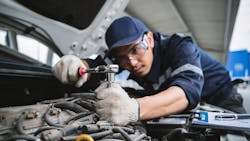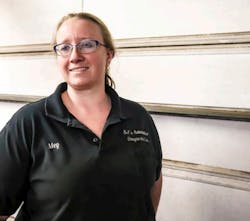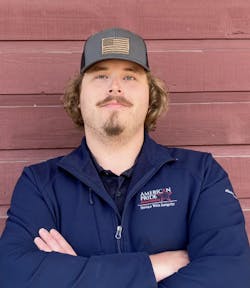As stated by the late Stephen Covey, “An empowered organization is one in which individuals have the knowledge, skill, desire and opportunity to personally succeed in a way that leads to collective organizational success.” While this could be true of service advisors, parts managers and customer service representatives, it rings truest of the automotive technician—the backbone of shop service.
Their ability to apply acquired knowledge and convert it into new skills, and then use those broadened skills to improve the shop’s customer experience, adds importance to their role that makes the entire shop successful.
Along with a student’s hunger for knowledge, Ratchet+Wrench spoke to two nationally-recognized auto technicians about four other skills top auto repair technicians should possess. Here are the abilities they say make technicians exceptional in the bay.
Thirsty for Knowledge
"Training is absolutely crucial. I mean, our world is changing on a day-to-day basis sometimes, and if you do not take the time to invest in yourself as far as knowledge, tools and different training opportunities, you will very quickly fall behind. So training is one of those things that I take incredibly seriously,” Lewis says.
Meg says that a tech committed to being the best they can be needs to have a hunger to learn that transcends going only to employer-financed structured training sessions and conferences. Learning needs to be something to do on their own in their spare time.
“I've done basic belts and hoses training on my own; little half-an-hour online book courses. You learn some different pointers and things to look for, especially with the changing technology. It's just (knowing) the little odds and ends. It's not big enough to be covered in the more in-depth courses,” Lewis says.
Brandon Sadler of American Pride Automotive in Williamsburg, Virginia, the 2022 AAPEX Technician of the Year, agrees. He says that as the industry is transitioning at such a rapid pace, top techs are those who keep up and who don’t shun learning.
“I've always said the second you stop pursuing education in this trade is the second you should get out of it. Education is probably the biggest thing to pursue in this field; turning the bolts is only 10% of the job,” he says. “(The best techs) are the ones that are going to spend hours off the clock researching or reading about whatever their interests are in this trade.”
Focused on Customer Safety
When a customer brings their vehicle into the shop for a particular problem, the technician has to ensure that not only is the problem addressed, but that the entire vehicle is safe for the road. Lewis says the best technicians develop systems that, though may seem repetitive, are thorough and have the customer’s safety at the top of their mind.
“It is probably our No. 1 priority, especially when it comes to safety. I mean, we are all human and we will miss things. That's just the name of the game. However, if you have a good system in place for good work habits and a system for looking over the vehicle in the same way every single time, you're less likely to miss something, especially when it comes to safety concerns. Nobody likes a vehicle that you just looked at coming back into the yard on a back of a tow truck or, worst-case scenario, involved in an accident because of something you missed,” Lewis says.
Seeks Collaboration
Lewis says as shops grow and add new technicians, top technicians look for opportunities to help mentor and train new hires in the shop to get them performing at a higher level faster.
“It's huge especially when you have incoming technicians who may not have as much experience as you have. We are an industry that is severely short on the mechanical technician part of it. We need to be able to take the time to show the next generation of technicians how to do their job, how to do their job well and also be able to fine-tune those skills so that as they get older and move up in the industry there are people to replace us when we retire,” Lewis says.
She says the only challenge with collaboration can happen when the pay plan makes it harder for a high performer to stop their work to lend a hand. It’s not something she must concern herself with, but she acknowledges it exists.
“It depends on how the shop is set up. If your shop pays your technicians a flat rate, then you have a technician environment that is less conducive to being helpful, let alone training. We are a very small, close-knit family so to speak. So, we have a very teaching and helpful environment to be able to support that,” Lewis says.
Overcommunicates
Sadler says his shop’s ability to give customers top-level service rises and falls on the technician's ability to provide clear and specific communication to the front of the“Thorough text and wording go a long way. As a diagnostic technician, which was a majority of my career, I spent a majority of my time typing up a thorough explanation of what tests I did, what tests need to still be done, what direction we need to go with the car next or what components I've tested and that have tested good. It would be nothing for me to type up 1,000 words or 1,200 words just to explain what testing I've done so I can be as thorough to my service department as I could be and as thorough to my customer as I can be,” Sadler says.
A Time Management Wizard
One of the best qualities of top-performing technicians is being situationally aware. They know what’s on the board and they know mentally how much time each repair will take to get the vehicle back to the customer in a timely fashion.
“I know here at our shop, we do anywhere from 20 to 25 cars a day with four people. So, I mean, it's virtually impossible for one of those guys to only have one car in their bay at a time. In a trade where you're juggling two to three cars at a time, it is very important for a technician to have an understanding of what job they're being assigned, how much time does that pay and what is the best course of action to not only finishing that job but how can I finish that other job that's next to it?” says Sadler.
He says techs and management should come to a consensus on how much time each vehicle should take so they’re on the same sheet of music and can accurately relay that information to the customer.
“It definitely takes a working mind to be able to prioritize things in a manner that suits the customer and the company,” says Sadler. “It also takes a little bit of diligence to make sure that you maintain that mindset of being able to repair multiple cars at one time. You have to have that mindset of just really paying attention.”
Lewis says as a new technician grows into the job and wants to excel, learning to identify those weaknesses in time management goes a long way to ensuring career-long success.
“Once that time is gone, you cannot get it back,” Lewis says. “So, if you are working on a job and you are starting to fall behind, it is so easy to get frustrated and not be able to recognize why did I fall behind on this job. Was it because I didn't have the knowledge to do this job? Was it because, you know, some components were missing? Did I not get the right components? So being able to identify what makes you efficient as a technician does play a significant role in our day-to-day life.”
About the Author
Chris Jones
Group Editorial Director
Chris Jones is group editorial director for the Vehicle Service & Repair Group at EndeavorB2B.
A multiple-award-winning editor and journalist, and a certified project manager, he provides editorial leadership for the auto care industry's most trusted automotive repair publications—Ratchet+Wrench, Modern Tire Dealer, National Oil & Lube News, FenderBender, ABRN, Professional Distributor, PTEN, Motor Age, and Aftermarket Business World.
Subscribe to receive news and updates from any of these industry-leading brands.



